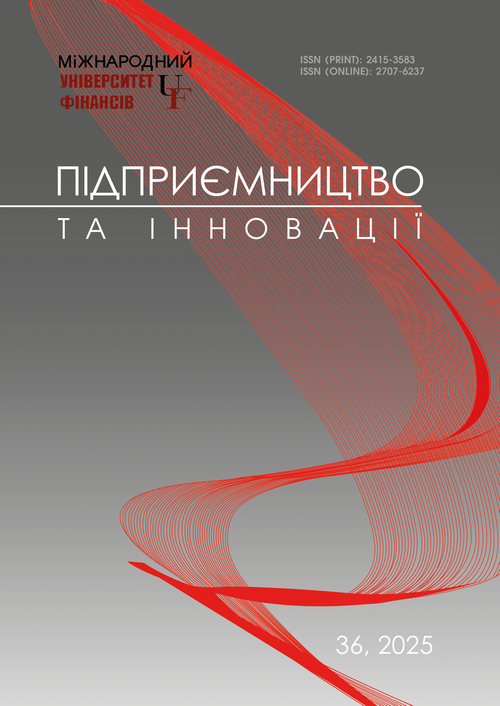ANALYSIS AND MODELING OF RISKS OF LOGISTICS SYSTEMS USING ARTIFICIAL INTELLIGENCE IN THE CONDITIONS OF GLOBAL INSTABILITY
Abstract
This article investigates the risks faced by logistics systems in the context of global instability and explores the potential of artificial intelligence (AI) for their prediction, prevention, and effective management. The study emphasizes the role of advanced technologies—machine learning (ML), deep learning (DL), neural networks, expert systems, big data analytics, and the Internet of Things (IoT)—in developing intelligent and adaptive logistics models. The research identifies and categorizes key types of risks—economic, geopolitical, technological, ecological, and operational—and describes how AI-based approaches can be employed for their detection, classification, modeling, and mitigation. The application of AI allows for the real-time monitoring of supply chain vulnerabilities, enhances predictive capabilities, and supports strategic decision-making under uncertainty. Special attention is given to the integration of digital twins, AR (augmented reality), and AI-powered autonomous transport in creating virtual models of logistics systems for scenario analysis. These technologies enable logistics operators to simulate potential risk situations, predict disruptions, and optimize resource allocation. The article reviews global and domestic practices, including the experience of Maersk and DHL in applying machine learning to minimize transportation delays, as well as Nova Poshta’s use of big data for forecasting seasonal demand surges in Ukraine. These examples highlight the growing reliance on AI to increase resilience and responsiveness in logistics operations. The paper also discusses the importance of ethical AI in logistics, stressing the need for transparent algorithms, data security, and the ethical implications of automated decision-making. A step-by-step framework for implementing AI in logistics risk management is proposed, including risk auditing, algorithm selection, IoT and data integration, decision automation, and continuous model adaptation. Overall, the research argues that AI is not just a technological enhancement but a critical strategic tool for building robust, flexible, and competitive logistics systems in a rapidly changing world.
References
Зрибнєва І. П. Аналіз новітніх технологій, методів та підходів у логістиці, їх вплив на оптимізацію ланцюгів постачання та підвищення продуктивності. Економіка та суспільство. 2024. Вип. 60. DOI: https://doi.org/10.32782/2524-0072/2024-60-60
Кирлик Н. Ю. «Штучний інтелект» та його використання в логістичних процесах. Економічні науки та управління. 2021. № 9–10. С. 59-66. URL: https://eco-science.net/wp-content/uploads/2021/12/9-10.21._topik_Kyrlyk-N.Yu_.59-66.pdf
Костира В. С., Запотічний І. І. Роль інформаційних технологій в управлінні клієнтоорієнтованістю сучасних підприємств. Дослідження та інновації, 2024. Т. 3, № 3. С. 95–102. URL: https://rni.com.ua/index.php/ri/article/download/38/36/142
Михайлик Н. І. Вплив технологій на базі штучного інтелекту на фінансово-економічну ефективність логістичних систем. Актуальні проблеми економіки та управління. Випуск 8/2025. URL: https://a-economics.com.ua/index.php/home/article/view/254
Петренко В. О. Цифрові технології в управлінні логістичними ризиками: сучасний стан та перспективи розвитку. Логістика та управління ланцюгами постачання. 2022. № 4. С. 112–125. URL: https://www.supplychainjournal.com.ua/index.php/journal/article/view/112
Сидоренко С., Добришин Ю., Максименко М. Загрози та ризики використання штучного інтелекту. Кібербезпека: освіта, наука, техніка., 2023. Т. 1, № 1. С. 45–52. URL: https://csecurity.kubg.edu.ua/index.php/journal/article/view/5207.
Череп О., Михайліченко Л. Розвиток штучного інтелекту: переваги та недоліки. Економіка та суспільство. Випуск 67/2024. URL: https://economyandsociety.in.ua/index.php/journal/article/download/4719/4660
Zrybnieva, I. P. (2024). Analiz novitnikh tekhnolohii, metodiv ta pidkhodiv u lohistytsi, yikh vplyv na optymizatsiiu lantsiuhiv postachannia ta pidvyshchennia produktyvnosti [Analysis of new technologies, methods, and approaches in logistics, their impact on supply chain optimization and productivity improvement]. Ekonomika ta suspilstvo, (60). DOI: https://doi.org/10.32782/2524-0072/2024-60-60
Kyrlyk, N. Yu. (2021). “Shtuchnyi intelekt” ta yoho vykorystannia v lohistychnykh protsesakh [“Artificial intelligence” and its use in logistics processes]. Ekonomichni nauky ta upravlinnia, (9–10), 59–66. Available at: https://eco-science.net/wp-content/uploads/2021/12/9-10.21._topik_Kyrlyk-N.Yu_.59-66.pdf
Kostyra, V. S., & Zapotichnyi, I. I. (2024). Rol informatsiinykh tekhnolohii v upravlinni kliientooriiientovanistiu suchasnykh pidpryiemstv [The role of information technologies in managing customer orientation of modern enterprises]. Doslidzhennia ta innovatsii, 3(3), 95–102. Available at: https://rni.com.ua/index.php/ri/article/download/38/36/142
Mykhailyk, N. I. (2025). Vplyv tekhnolohii na bazi shtuchnoho intelektu na finansovo-ekonomichnu efektyvnist lohistychnykh system [Impact of artificial intelligence-based technologies on the financial and economic efficiency of logistics systems]. Aktualni problemy ekonomiky ta upravlinnia, (8). Available at: https://a-economics.com.ua/index.php/home/article/view/254
Petrenko, V. O. (2022). Tsyfrovi tekhnolohii v upravlinni lohistychnymy ryzykamy: suchasnyi stan ta perspektyvy rozvytku [Digital technologies in logistics risk management: current state and development prospects]. Lohistyka ta upravlinnia lantsiuhamy postachannia, (4), 112–125. Available at: https://www.supplychainjournal.com.ua/index.php/journal/article/view/112
Sydorenko, S., Dobryshyn, Yu., & Maksymenko, M. (2023). Zahrozy ta ryzyky vykorystannia shtuchnoho intelektu [Threats and risks of using artificial intelligence]. Kiberbezpeka: osvita, nauka, tekhnika, 1(1), 45–52. Available at: https://csecurity.kubg.edu.ua/index.php/journal/article/view/5207
Cherep, O., & Mykhailichenko, L. (2024). Rozvytok shtuchnoho intelektu: perevahy ta nedoliky [Development of artificial intelligence: advantages and disadvantages]. Ekonomika ta suspilstvo, (67). Available at: https://economyandsociety.in.ua/index.php/journal/article/download/4719/4660



